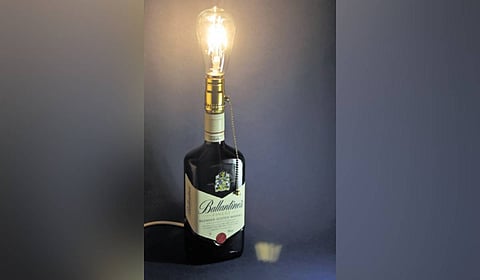

KOCHI: Waste management seems to be a perennial bane for Kerala. While systems exist for managing solid waste like biodegradable materials and plastics, there is little to no infrastructure for the proper disposal of glass. As a result, glass items inevitably end up in landfills.
This issue inspired Renjini Thampi, an artist from Tripunithura in Kochi, to transform discarded glass bottles into home decor pieces through her company Vapasee.
Sharing the story, Renjini Thampi says, “My husband often visited scrap dealers to find discarded items that could be repurposed into art pieces. During these visits, I noticed that while the dealers collected items with resale value, glass items were always left behind. When we asked what happened to them, we learnt they were dumped in landfills.” Renjini realised that many of these glass items were not beyond reuse and could be upcycled into collectable pieces.
To date, she has upcycled over 28,000 glass bottles.
Art has always been Renjini’s passion, and she frequently experimented with discarded materials like broken furniture and metal items to create decor pieces.
However, the pressing issue of glass waste in Kerala motivated her to delve deeper.
“I conducted surveys and spoke to people. I also learned about the environmental impact of glass manufacturing — how massive amount of sand is mined, only for the products to end up polluting landfills,” she explains.
This spurred her to explore upcycling as a solution. “The idea was not just to create art pieces but also utility products and value-added items. With more people responding to our call for glass bottle collection, I started designing new products,” she says.
Renjini also began organising glass bottle collection drives. Speaking about the types of glass and their usability, she notes, “Not all glass can be upcycled. Some are sent to recycling centres where they are melted down into their molten form in special furnaces and later, remoulded as various items. The rest we transform into new products.”
Kerala once had several glass factories that recycled empty bottles, but with most of them shutting down, managing glass waste has become a challenge.
“Now, all glass waste from Kerala is transported to a factory in Firozabad in Uttar Pradesh. But transporting glass is an expensive process,” she points out.
As for the products Vapasee creates, Renjini explains, “We convert glass bottles and alcohol bottles into items like tumblers and candle jars. Some bottles are melted and moulded into platters and art pieces after adding pigments and additives.”
Renjini credits organisations like the Climate Collective and IIM Bangalore’s NSRCEL, an incubation centre for startups and emerging businesses, for helping turn her vision into a sustainable business.
“The Climate Collective was the first to believe in my idea. Their Climate Launchpad programme shaped my approach and helped me focus on creating a larger impact to reduce pollution,” she says.
She also highlights the significance of joining the Women Climate Collective, calling it a turning point.
“It pushed me to expand my horizons, and being selected as one of 20 change-makers in India dedicated to building a better world was an incredible honour,” she adds.